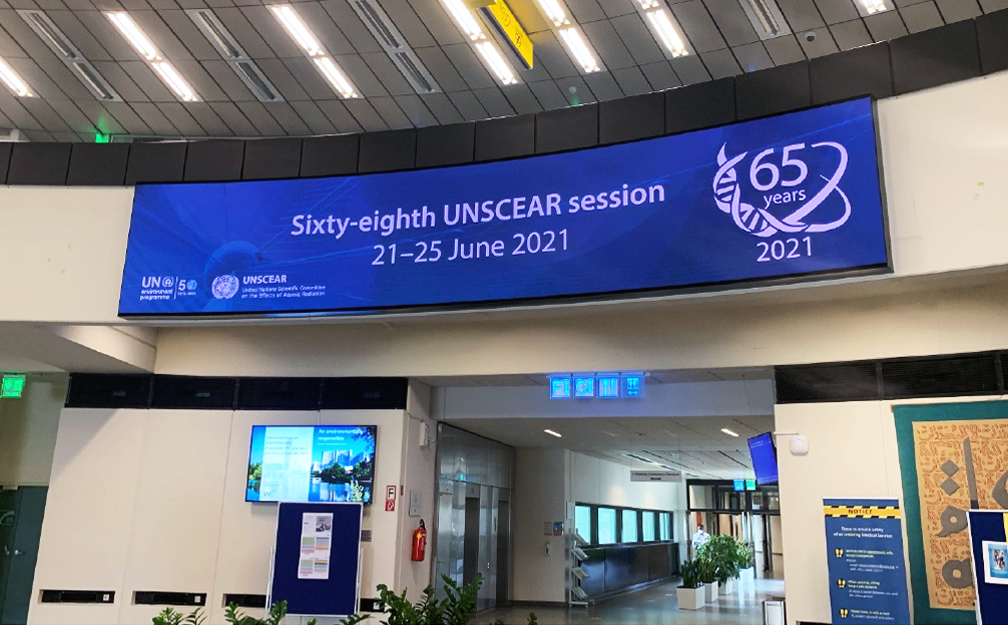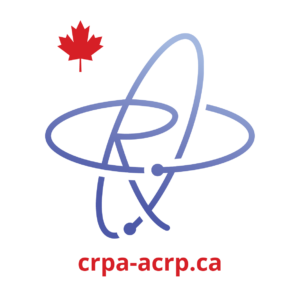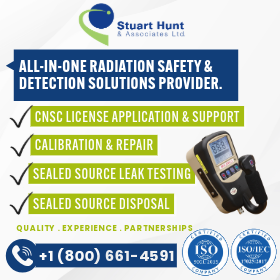68e séance du Comité scientifique des Nations Unies pour l’étude des effets des rayonnements ionisants (UNSCEAR)
Introduction
The United Nations Scientific Committee on the Effects of Atomic Radiation (UNSCEAR) was established by the General Assembly of the United Nations in 1955. Its mandate is to assess and report levels and effects of exposure to ionizing radiation. For more information, visit the UNSCEAR website.
The 68th session of UNSCEAR, which took place from June 21 to 25, 2021, was held virtually for the second year in a row due to the ongoing COVID-19 pandemic. A total of 219 participants from 27 member states, 4 observer states, and 12 international organizations registered for the session.
This session also marked the 65th anniversary of UNSCEAR. Representatives from the United Nations Environment Programme, the United Nations Office in Vienna, and the International Atomic Energy Agency provided congratulatory statements. Videos of these statements can be viewed on the UNSCEAR website.
68th session
The 68th session was kicked off by Gillian Hirth (chair), who opened the meeting, and Borislava Batandjieva-Metcalf (secretary), who presented an update on UNSCEAR’s work since the 67th session. This included the publication of the UNSCEAR 2019 Report, Sources, Effects and Risks of Ionizing Radiation, and an advanced online publication of Annex B of the UNSCEAR 2020 Report, “Levels and Effects of Radiation Exposure due to the Accident at the Fukushima Daiichi Nuclear Power Station: Implications of Information Published since the UNSCEAR 2013 Report.” In addition, the UNSCEAR global survey on public exposure was launched in March 2021.
The secretariat is planning to publish Annex A and Annex C of the UNSCEAR 2020 Report on medical exposure and biological mechanisms later this year.
The session included a technical discussion on the evaluation of occupational exposure to ionizing radiation and discussions of progress reports presented for evaluation on the following programs of work:
- Second primary cancer after radiotherapy
- Epidemiological studies of radiation and cancer
- Public exposure due to ionizing radiation
- Implementation of the Committee’s strategy to improve collection, analysis, and dissemination of data on radiation exposure
- Implementation of the Committee’s public information and outreach strategy for 2020–2024
The session concluded with a discussion on the implementation of the Committee’s future program of work (2020–2024), which includes the evaluation of circulatory diseases associated with radiation exposure that is planned to commence this year.
Notable topics of discussion included:
- Quantities and units
- Evaluating and communicating uncertainties
- Challenges in collecting occupational exposure information for certain applications (for example, radon exposures in workplaces other than mines)
- Challenges in collecting public exposure information for applications outside of the nuclear fuel cycle
A report to the General Assembly providing details on the deliberations of the 68th session will be prepared and posted on the UNSCEAR website.
Participation from Canada
The Canadian delegation consisted of the following experts from Health Canada, the Canadian Nuclear Safety Commission, and Arcadis Canada Inc.:
- Jing Chen (vice-chair and representative)
- Ruth Wilkins (alternate representative)
- Kiza Sauvé (advisor)
- Rachel Lane (advisor)
- Bertrand Thériault (advisor)
- Doug Chambers (advisor)
- Janet Gaskin (advisor)
This year, Canada contributed two part-time in-kind experts to the UNSCEAR secretariat for a period of one year:
- Julie Burtt (technical expert, radiation scientist)
- Adelene Gaw (technical expert, radiation scientist)
69th UNSCEAR session
The 69th session is planned to be in person in Vienna, Austria, from May 9 to 13, 2022.

Announcement of the 68th UNSCEAR Session at the Vienna International Centre.
Résumé : 68e séance du Comité scientifique des Nations Unies pour l’étude des effets des rayonnements ionisants (UNSCEAR)
La 68e séance du Comité scientifique des Nations Unies pour l’étude des effets des rayonnements ionisants (UNSCEAR) a eu lieu du 21 au 25 juin 2021. Pour la deuxième année consécutive, la séance s’est déroulée de façon virtuelle en raison de la pandémie mondiale de COVID-19. En tout, ce sont 219 participants de 27 États membres, 4 États observateurs et 12 organisations internationales qui ont participé à la séance. Janet Gaskin, analyste des politiques du Bureau de la radioprotection de Santé Canada, fournit un résumé de la séance, y compris une liste des participants canadiens.
 Janet Gaskin
Janet Gaskin
Janet Gaskin possède un doctorat en épidémiologie et une maîtrise en génie civil. Ses travaux de recherche actuels portent sur l’estimation du fardeau du cancer du poumon attribué au radon domestique, sur le plan international et national, l’évaluation de l’efficacité des technologies de réduction des émissions de radon et le rapport coût-efficacité de la mise en œuvre de ces technologies dans les foyers canadiens. En 2020, Janet a fait partie de la délégation canadienne au UNSCEAR.
Vous voulez lire d’autres articles comme celui-ci ?
Le Bulletin de l’Association canadienne de la radioprotection (ACRP) est une publication essentielle à tout professionnel de la radioprotection du Canada. Son contenu éditorial procure aux professionnels de la radioprotection les enseignements, l’information, les conseils et les solutions utiles, tous nécessaires pour demeurer à l’avant-garde de la profession.
Abonnez-vous aujourd’hui pour que nous vous envoyions un courriel chaque fois qu’un nouveau numéro est mis en ligne. Revisitez souvent le site entre chaque numéro pour obtenir les mises à jour et consulter de nouveaux articles.
Ne ratez aucun numéro. Abonnez-vous dès aujourd’hui !
Abonnez-vous

 Janet Gaskin
Janet Gaskin

